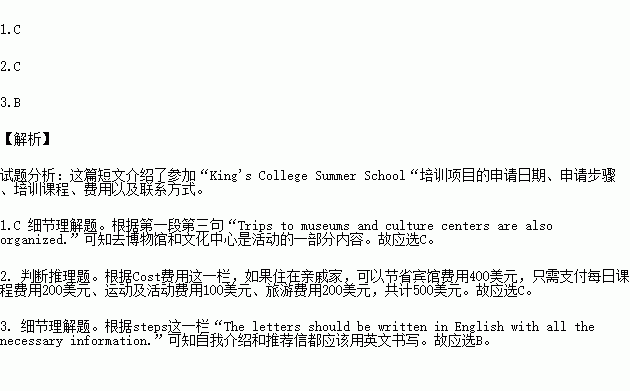题目内容
King's College Summer School
King's College Summer School is an annual training program for high school students at all levels who want to improve their English. Courses are given by the teachers of King's College and other colleges in New York. Trips to museums and culture centers are also organized. This year's summer school will be from July 25 to August 15.
More information is as follows:
Application date Students in New York should send their applications before July 18, 2016. Students of other cities should send their applications before July 16, 2016. Foreign students should send their applications before July 10, 2007. | Courses English Language Spoken English: 22 hours Reading and Writing: 10 hours American History: 16 hours American Culture: 16 hours |
Steps A letter of self-introduction A letter of recommendation ﹡ The letters should be written in English with all the necessary information. | Cost Daily lessons: $200 Sports and activities: $100 Travels: $200 Hotel service: $400 ﹡You may choose to live with your friends or relatives in the same city. |
Please write to: Thompson, Sanders 1026 King' s Street New York, NY 10016, USA E-mail: KC-Summer-School@ yahoo, com | |
1.Which of the following is true about King's College Summer School?________
A. Only top students can take part in the program.
B. King's College Summer School is run every other year.
C. Visits to museums and culture centers are part of the program.
D. Only the teachers of King's College give courses.
2.If you are to live with your relatives in New York, you will have to pay the school _______
A. $200 B. $400 C. $500 D. $900
3.What information can you get from the text? ________
A. The program will last two months.
B. You can write to Thompson only in English.
C. As a Chinese student, you can send your application on July 14, 206.
D. You can get in touch with the school by e-mail or by telephone.

